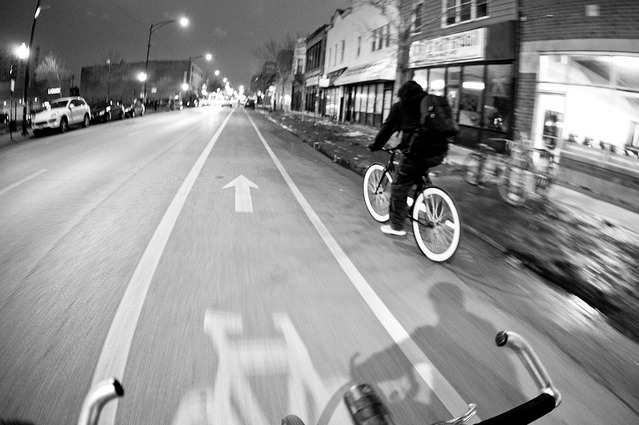Will Curb-Protected Bike Lane On Clybourn Help Or Hurt Business?
By Rachel Cromidas in News on Jun 24, 2015 2:40PM
As one of the city's first curb-protected bike lanes is going in on the stretch of Clybourn Avenue where cyclists Bobby Cann was tragically killed by a motorist, some local business owners are wondering what impact it will have on business.
In an unprecedented move by the city and state departments of transportation to bring one of the most protective bike lane models to Chicago, workers began the construction of a special bike lane on an Old Town stretch of Clybourn Avenue. The design calls for the creation of a three foot-wide concrete, curb-like barrier between cyclists and cars on the opposite side of the lane from the sidewalk, and the elimination of some parkings spots.
The lane runs from North Avenue to Division Street and briefly on Division Street from Clybourn Avenue to Orleans Street. The lane will pass the place where 26-year-old Cann was riding when a motorist fatally struck him in 2013. The latest hearing in the court case against the motorist, who has been accusing of driving under the influence, is scheduled for Thursday.
Illinois DOT officials have called the lane a test-run as it is the first of its kind to go up on a state road. The cycling community considers the curb-protected lane to be one of the safest types of bike lanes for urban roads.
But some business leaders are concerned about the effect the lane and the elimination of about 65 parking spots will have on the local economy. Mohammad Rafiq, owner of the restaurant New Zaika, at 1316 N. Clybourn Ave., told a DNAinfo reporter the loss of parking could ruin his business, which has an Islamic prayer room in its basement that is frequented by Muslim cab drivers who need the parking spots.
Marcus Moore, the owner of Yojimbo's Garage and a witness to Cann's death, told the reporter he was neutral about the project because of its potential maintenance costs. Streets and Sanitation officials have said curb-protected bike lanes could sometimes be more challenging to plow when it snows.
But could the bike lanes that eliminate parking spaces actually become a boon for business? Some researchers believe the lanes have paid off that way in other cities, such as Seattle and New York. By making the roads safer for bike traffic, the lanes encourage residents to frequent local businesses without requiring them to park.
Again and again, local studies have shown that protected bike lanes usually have no effect on area business, but sometimes may contribute to improving business. Protected bike lanes can attract workers who can bike to work and thus won't take up parking spaces getting to work, and increase retail visibility and sales volume.
As one San Francisco study concluded, "Land is more valuable if more people can get to it easily. Bike networks can help relieve pressure on the street system ... without swamping the streets with traffic."
That study and most others on the economic impact of bike lanes were performed by green transportation advocacy groups, but that doesn't necessarily discount them. How the Clybourn Avenue bike lane performs once it's up and running later this year could determine how easily the city pushes new protected bike lane projects to the streets.
